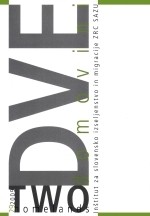Women in Diplomacy: Their Private Transnational Practices
Keywords:
diplomacy, transnational migration, women, practices, objectsAbstract
The paper concerns women in diplomacy observed through the anthropological perspective of migrants’ transnational practices. It focuses on the transnational practices of women in diplomacy that include efforts to establish and maintain the everyday normality of their own choices in their temporary place of living. Shifting attention from less privileged to multiply privileged transnational migrants enables potential insights into the similarities of their practices of negotiating normality by the means of objects and ways of communication in different places of everyday life.
Downloads
References
Amit, Vered (2007). Structures and Dispositions of Travel and Movement. Going First Class? New Approaches to Privileged Travel and Movement (ed. Vered Amit). New York and Oxford: Berghahn Books, 1–14.
Brettell, Caroline (2003). Anthropology and Migration: Essays on transnationalism, ethnicity, and identity. Walnut Creek, Lanha. New York and Oxford: Altamira Press.
Burrell, Kathy (2008). Managing, Learning and Sending: The Material Lives and Journeys of Polish Women in Britain. Journal of Material Culture, 13 (1), 63–83.
Charmaz, Cathy (2006). Constructing Grounded Theory. A Practical Guide Through Qualitative Analysis. London: Sage Publications.
Curtis, Barry and Claire Pajaczowska (1994). ‘Getting there’: travel, time and narrative. Travellers’ Tales: Narratives of Home and Displacement. (eds. George Robertson et al.). London and New York: Routledge, 199–215.
Douglas, Mary (1991). The idea of home: a kind of space. Social Research, l (1), 287– 307.
Faist Thomas (2004). The transnational turn in migration research: perspectives for the study of politics and polity. Transnational Spaces: disciplinary perspectives - Willy Brant conference proceedings (ed. Maja Povrzanović Frykman). Malmo: Malmo University, 11–45.
Fechter, Meike (2007). Living in a Bubble: Expatriates’ Transnational Spaces. Going First Class? New Approaches to Privileged Travel and Movement (ed. Vered Amit). New York and Oxford: Berghahn Books, 33–52.
Fog Olwig, Karen (2007). Priviledged travelers’ migration Narratives in families of Middle Cllas Caribbean Background. Going First Class? New Approaches to Privileged Travel and Movement (ed. Vered Amit). New York and Oxford: Berghahn Books, 87–102.
Gustafson, Per (2004). More or less transnational: two unwritten papers. Transnational Spaces: disciplinary perspectives - Willy Brant conference proceedings (ed. Maja Povrzanović Frykman). Malmo: Malmo University, 64–76.
Hannam, Kevin, Mimi Sheller and John Urry (2006). Editorial: Mobilities, Immobilities and Moorings. Mobilities, 1 (1), 1–22.
Kurotani, Sawa (2007). Middle-Class Japanese Housewives and the Experience of Trans national Mobility. Going First Class? New Approaches to Privileged Travel and Movement (ed. Vered Amit). New York and Oxford: Berghahn Books, 15–32.
Levitt, Peggy and Glick, Schiller Nina (2004). Conceptualizing Simultaneity: A Transnational Social Field Perspective on Society. International Migration Review, 38 (3), 1002–1039.
Löfgren, Ovar (1999). The Nationalization of Anxiety. Ethnologia Scandinavica, 29, 5–28.
Marcoux, Jean-Sebastien (2001). The Refurbishment of Memory. Home Possessions: Material Culture Behind Closed Doors (ed. Daniel Miller). Oxford: Berg, 69–86.
Marcoux, Jean-Sebastien (2001). The ‘casser maison’ ritual: constructing the self by emptying the home. Journal of Material Culture, 6 (2), 213–235.
Marcus, George (1995). Ethnography in/of the World System: The Emergence of the Multi-Sited Ethnography. Annual Review of Anthropology, 24, 95–117.
Petridou, Elias (2001). The Taste of Home. Home Possessions: Material Culture Behind Closed Doors (ed. Daniel Miller). Oxford: Berg, 87–104.
Povrzanović Frykman, Maja (2003). Bodily Experiences and Community-Creating Implications of Transnational Travel. Being There. New Perspectives on Phenomenology and the Analysis of Culture (ed. Jonas Frykman and Nils Gilje). Lund: Nordic Academic Press, 53–77.
Povrzanović Frykman, Maja (2008). Migrants and Objects: Material Practices of Being and Belonging in Transnational Social Fields. Paper presented at the 10th. EASA conference, Ljubljana 26–30 August, 2008, in the workshop Belonging embodied, reciprocity materialized: migrants’ transnational practices.
Sutton, David (2001). Remembrance of Repast: An Anthropology of Food and Memory. Oxford: Berg.
Torresan, Angela (2007). How Privileged Are They? Middle-Class Brazilian Immigrants in Lisbon. Going First Class? New Approaches to Privileged Travel and Movement (ed. Vered Amit). New York and Oxford: Berghahn Books, 103–125.
Downloads
Published
How to Cite
Issue
Section
License

This work is licensed under a Creative Commons Attribution-NonCommercial-NoDerivatives 4.0 International License.
Authors guarantee that the work is their own original creation and does not infringe any statutory or common-law copyright or any proprietary right of any third party. In case of claims by third parties, authors commit their self to defend the interests of the publisher, and shall cover any potential costs.
More in: Submission chapter





